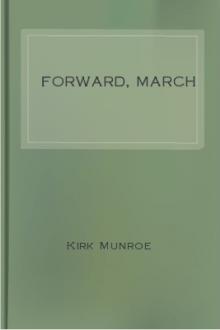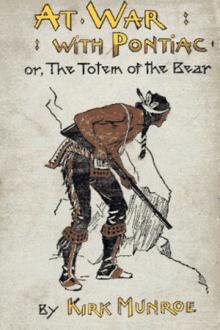Forward, March, Kirk Munroe [some good books to read .txt] 📗

- Author: Kirk Munroe
- Performer: -
Book online «Forward, March, Kirk Munroe [some good books to read .txt] 📗». Author Kirk Munroe
"Here we had begun to break our fast when your mare notified us of your proximity," said the leader, who had already motioned to his men to loose their hold on the young American. "Now if you will honor us with your company, we will resume that interrupted pleasure. Manuel, we wait to be served."
Upon this a grinning negro brought in a basketful of yams that had evidently been roasted among the ashes of an open fire, and set it on a rude table. Beside it he placed a calabash containing a drink mixed of water, lime-juice, and brown sugar. "Let us eat," said the host, reaching for one of the ash-encoated yams. "But hold," he added, as though with a sudden thought. "Excuse me for a moment." Thus saying, he stepped outside, only to return with Ridge's saddle-bags, which he coolly opened. "Coffee, as I live!" he cried, "and hard biscuit, the first bread I have seen in many a month! Señor, we are under obligations to you for these welcome additions to our menu. Manuel, hast thou forgotten how to make coffee, strong, and black as thine own ebony face? Waste thou not one precious grain, or, by holy St. Jago, I will blow out thy meagre brains."
Provoked as Ridge was at seeing his entire stock of provisions thus appropriated to be expended on a single meal, he was not in a position to remonstrate. So, a little later, when a revised edition of breakfast was pronounced ready, he sat down with the host whom he did not yet know whether to consider as friend or foe, and ate heartily of the food thus provided.
The furnishing of that rude table was unique, for, mingled with shells from the beach and those of cocoanuts, both of which were used in place of cups, gourds, plantain-leaves, and wooden trays, appeared several dishes of cut glass and dainty china, generally cracked or chipped, and looking wofully out of place.
Seeing that Ridge noticed these, the host said, carelessly:
"Ah yes, señor, we have seen better days!" Then, lighting a cigarette, he continued, more sternly, "Now, sir, can you give any reason why I should not have you led out and shot as a spy?"
"You would not dare do such a thing!" replied Ridge, indignantly.
"Oh! wouldn't I? My friend, you do not realize into whose hands you have fallen. Now, merely to prove that I have both the inclination and power to carry out my threat, I will have you shot. Lope! Garzo!"
Two of the ragged bandits immediately appeared.
"Bind me the arms of this man and blindfold him."
The order was deftly obeyed.
"Now take him from my sight and shoot him."
Seizing Ridge by the shoulders, the men began to drag him away.
Until this moment he had not known whether to acknowledge himself an American or claim to be a Spaniard, nor had he believed that the extremely courteous leader of bandits with whom he had just breakfasted, and who might be either a Cuban patriot or a Spanish guerilla, would do him serious injury. Now, moved by an agony of terror, he shouted out the word whispered to him a few hours before by the commander of the Speedy, the secret countersign of the Cuban Junta.
Its effect was magical. The men who were dragging him to a summary execution loosed their hold and stared at him in amazement, while the young leader sprang to where Ridge stood, tore the bandages from his eyes, severed his bonds, and embraced him.
"Why, my brother, did you not disclose your identity long ago?" he said.
"Because," replied Ridge, in a voice that still trembled from his recent fright, "I knew not to which side you belonged."
"What! Did you for a moment think that I might be a vile Spaniard? I, Enrico del Concha, a Cuban of the Cubans? Alas! that such a suspicion should fall upon one of my name."
"And what," inquired Ridge, "did you take me for?"
"A Spanish spy, of course. Do you not speak the language without even a Cuban accent? Did you not decline to tell me how or what you were? Above all, did you not carry on your person despatches addressed to certain Spanish generals?"
Ridge clapped a hand to his breast pocket.
"Yes, señor, they are gone," laughed the other.
"My rogues are clever thieves, and took them from you when we first met, together with your money, for which they were searching. Hereafter you must provide for your private papers a place of greater safety. Now let us have one more cup of that delicious coffee while you confide to me who you are and why you are here."
Under the circumstances, Ridge felt that a frank avowal of his personality and present plans would be wiser than any attempt at deception, and this he proceeded to make. To all that he had to tell the bandit leader paid closest attention, and listened without a word of interruption until the narrative was finished. Then he said:
"It is indeed great news that the Americans are about to invade Cuba. Until now they have promised much and done worse than nothing, since, by their blockade of Cuban ports, they have only starved to death thousands of miserable reconcentrados. Now if they will proceed with judgment and are not swept off by fevers, something may be accomplished. At the same time, from the ignorance displayed in sending on so important a mission as yours one so ill equipped for it, I cannot hope for much from them."
Ridge flushed hotly. "What do you mean?" he asked.
"I mean," replied the other, coolly rolling a cigarette as he spoke, "that you have shown yourself to be about as fit for the duty you have undertaken as a babe in arms. Did you not, upon landing, waste a whole hour of precious darkness during which you might have gained a safe distance from the always-guarded coast? Did you not allow yourself to be betrayed by your horse, and captured without resistance? Did you not lose your despatches at the outset, and almost your life as well? Are you not at this moment densely ignorant of the route you are to travel, and of how to meet the enemies you will encounter on every hand?
"Yes, my friend, brave and resolute as you may be, you are also but a babe in your undertaking. Your only forethought lay in securing the countersign of the Junta, which has for the moment saved your life, since I should certainly have caused you to be shot but for it. Also, if I had not discovered you, the Spanish hawks who patrol the coast would have had you in their clutches a few minutes later. Nor do you at this moment know how to find your way to Holguin, much less to Santiago."
"But," argued Ridge, whose self-conceit and confidence in his own ability to carry out the mission he had so bravely undertaken were rapidly oozing away, "I have a good map of the country, a good horse, plenty of money with which to hire guides, am well armed, and could make a good fight if necessary. I speak Spanish perfectly, am dark of complexion, possess the countersign of the Junta for Cubans, and letters from the chief of the Spanish secret service for Spaniards. Why, then, may I not succeed as well as another?"
"You had those things; but, with the exception of your ability to speak Spanish, your darkness of skin, and the countersign, all of them have been taken from you."
"But you will restore them?"
"And if I should, would they serve you? Do you imagine that any true Cuban would disclose to an utter stranger the military secrets of his country for money? If you do, you are sadly mistaken. Could you fight an enemy who would lie in ambush and shoot you in the back, reserving the examination of your despatches until you were dead? Even should you succeed in presenting those same despatches to a Spanish general, do you not know that he would hold you prisoner, or at least delay your departure until he had transmitted them to Havana for verification? Yet you hope to gain a complete knowledge of the military situation in this great province, and rejoin your friends more than a hundred miles away within a week. Amigo, you are very ignorant."
"Possibly I am," admitted Ridge, "but I have learned much from you within a short time; and if you will let me go, I will still undertake to accomplish my task within the time allotted to me."
"I admire your spirit," replied del Concha, "and will gladly release you, with all your property restored; but before so doing I wish to make some suggestions. In the first place, your people should have chosen an intelligent Cuban for this work--a man like myself, for instance."
Ridge was on the point of saying that his superior officers had feared to trust a Cuban, but prudently refrained from so doing.
"As they did not have the sense for that," continued the speaker, "it is most fortunate that you have met me, for I can give you, in a few words, the position and strength of every Spanish force in the province, as well as the location and condition of the Cuban armies, to which I will also gladly forward news of the anticipated American landing. Thus you will be free to make your way, directed by guides whom I will furnish, straight to Santiago without encountering any dangers other than those incident to travel through a rough country."
"While thanking you for your kind offer," replied Ridge, "I must still decline it. My orders are to communicate directly with the Spanish commanders at Holguin and Jiguani, and I shall certainly attempt to carry them out, since the first lesson taught every American soldier is that of absolute and unquestioning obedience to orders."
"My dear Lieutenant!" exclaimed del Concha--for this was the rank that Ridge had seen fit to assume--"I begin to perceive why you were chosen for this hopeless task, and though I utterly disapprove your proposed course of action, I cannot but admire your resolution. Also I cannot find it in my heart to leave you to your own helpless devices. Therefore I shall accompany you to the vicinity of Holguin. Then I shall at least be on hand to learn your fate as soon as it is decided."
Willing as he would have been to set forth alone, Ridge was glad to have the company of one so familiar with the country as del Concha appeared, and one also whom he believed he might trust. His confidence in the acquaintance thus strangely made was strengthened a little later as they rode together, and the latter, in answer to his questions, disclosed a portion of his own history.
"I came to this place last evening," he said, "in the hope of getting a few shots at the Spanish lancha, which, as I told you, patrols the coast twice daily; for Spaniards have become so scarce of late, and confine themselves so closely to the larger





Comments (0)